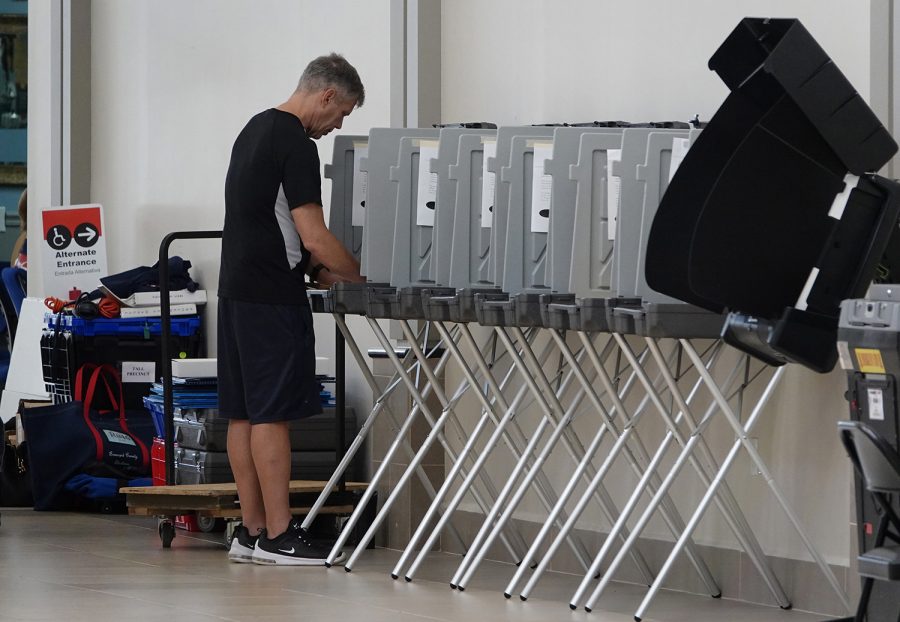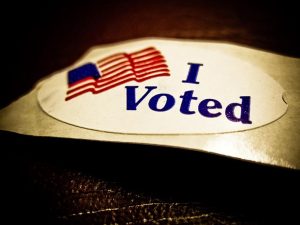Rosario: I’m not excited to vote, but I will anyway
Voting really is a civic duty in the unglamorous, obligatory sense of the word — but a duty nonetheless.
A voter marks his ballot, Tuesday, Aug. 28, 2018, at the Coral Ridge Mall in Fort Lauderdale. (Joe Cavaretta/South Florida Sun Sentinel/TNS)
October 28, 2018
While turning 18 signifies an important milestone of legal adulthood, I didn’t have many reasons to look forward to it two years ago. I had no interest in purchasing cigarettes. I knew I wouldn’t enlist in the military. I wasn’t thrilled to receive my full driver’s license. I did get a tattoo. Most importantly, as a teenager who was quite politically outspoken, I was excited to vote in the 2016 presidential election.
And, well, we know what happened there. I gritted my teeth as I checked the ballot box for Hillary Clinton and took a typical millennial selfie with my “I Voted Today” sticker. Suffice it to say that my vote was more in the interest of stopping the opposing candidate than supporting my chosen candidate. That day, I learned voting really is a civic duty in the unglamorous, obligatory sense of the word.
In recent years, I’ve seen how people have tried to make voting more fun — and for good reason. Research from the Knight Foundation found that organizing lively community festivals near polling sites significantly increases voter turnout. I’ve seen the positive effect of political letter-writing parties and voter-registration rallies to engage young people. And in the age of social media, organizations such as NextGen America and Rock the Vote have used creative ways to encourage the youth vote on-and-offline. Their work is invaluable.
RELATED: How to vote in the 2018 midterm election
But two years after the 2016 presidential election, I fail to see the fun in voting. I’m much more confident in whom I’m not voting for than whom I am voting for.
Under a GOP-controlled state Legislature, the per-member cost of Medicaid has nearly tripled since privatization, according to an Iowa Department of Human Services report. Most importantly, hundreds of Iowans have been denied services under the change. In 2017, Republicans gutted a more than 40-year-old collective-bargaining system that stripped rights from public employees. And the last session’s massive tax cuts to the wealthy are hard to stomach when k-12 schools have received just 1 to 2 percent aid increases in recent years.
Still, in the governor’s race, I am skeptical. Democratic candidate Fred Hubbell has released only three pages of a 2017 tax return. He staunchly opposes Medicaid privatization, which is a good thing for recipients, health-care professionals, and taxpayers alike, but his plan to fix it is rather ambiguous. I do admire his stated goals to work across the aisle and invest in education and health care over corporate tax cuts if elected.
Generally, both political parties have been unwilling to address Iowa’s problem with racial inequality. Perhaps that’s an easy choice in a state that’s 96 percent white. While African Americans make up just 3.1 percent of Iowa’s population, they are more than a quarter of the state’s prison population, according to a 2014 Sentencing Project study. In Iowa schools, multiple reports have found achievement gaps among black and white students, as well as evidence that black students are disciplined at disproportionate rates. These issues are well-documented, but they haven’t been major campaign talking points.
RELATED: 2018 Voter Guide
I’m not excited to vote, but I will anyway. Because by voting, I at least have a chance to be heard.
I will vote because around the country, that right we share as Americans is being suppressed, particularly in Georgia and North Dakota. I will vote because Asian Americans such as me did not get that right until 1952, and not all Americans did until 1965. Voting won’t guarantee we will elect politicians who work for all their constituents. It won’t fix problems that may not be politically self-serving to fix. But it’s the best chance we have. If you can — because so many Americans can’t — please vote.






